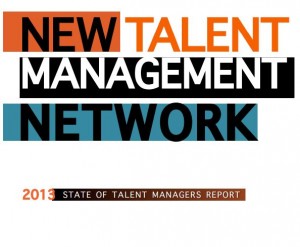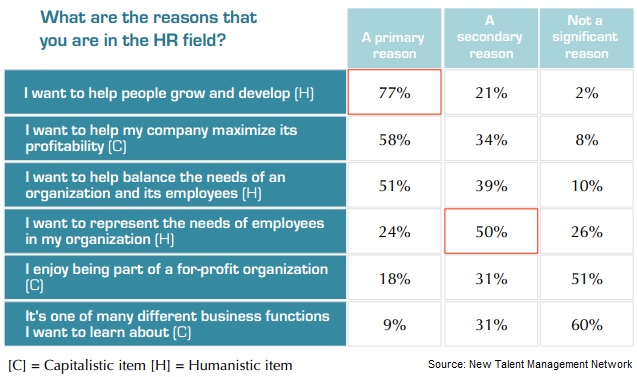I was chatting with some talent acquisition leaders at the recent ERE conference when I mentioned an innovative application being demo-ed by one of the vendors. It uses automated voice analysis to screen and help select customer service reps.
Almost instantly came OFCCP (Office of Federal Contract Compliance Programs) and EEOC (Equal Employment Opportunity Commission) objections, and near unanimous declarations of opposition to the tool. This is before anyone knew much about it.
What reminded me of this conversation was a report I came across a while ago. HR professionals chose their career, the report says, primarily because they “want to help people grow and develop.” Next, and way down the scale, was business growth and development as a career choice driver.
To be specific, 77 percent of HR professionals cited helping people as their primary reason for choosing the profession. In scoring the statement, “I want to help my company maximize its profitability,” 58 percent said it would be a primary reason for choosing HR.
Seat at the table? Only if you like what is served
Behind this unique survey of HR attitudes is noted author Marc Effron, himself an HR professional. His 2013 State of Talent Manager Survey, conducted for the New Talent Management Network, explored the motivations of HR professionals, their beliefs in their own leadership and influence, and their own career aspirations.
The findings, all of them, are troublesome for a profession already marginalized in many companies, said Effron.
While HR leaders use the title Business Partner, they’ve declared that business is not their primary interest. While they may see themselves as a necessary counter-balance to the unbridled pursuit of profits, they’re actually working against their own employer. You shouldn’t ask for a ‘seat at the table’ if you have no interest in what’s being served there.”
Effron’s report classifies half the career choice statements as humanistic, and the other half as capitalistic. It was that coding that prompted me to think of the ERE conversation. The risk aversiveness so on display by my tablemates is the very antithesis of today’s entrepreneurship. As journalist Thomas L. Friedman noted, what makes America the “greatest engine of innovation that has ever existed” is, among other things, “a risk-taking culture” and an unrivaled venture capital system.
“Few … aspire to any C-suite role”
Within HR, though, Effron’s “humanistic” influences on career choice outweighed those he categorized as “capitalistic.” Interesting enough, but other parts of the survey showed HR professionals are not especially interested in advancing up the career ladder. “Few of us aspire to any C-suite role,” Effron says.
The survey, remarkably, shows that most HR professionals have no greater career aspiration other than heading up their particular specialty. This means, writes Effron in the report, “it’s unlikely that HR will ever become a feeder population for senior executive roles.”
Equally as significant, is the lack of interest by specialists to move among other HR practice areas. “Without experience as HRBPs (HR Business Partners) and in other technical disciplines, talent leaders will lack the context to design holistic and realistic HR solutions,” the report says.
Not unexpectedly, those who have the fastest career trajectory are those with the stronger capitalistic reasons for choosing HR.
“Markedly overconfident in our abilities”
However, regardless of why they chose HR, more than two-thirds of the 720 survey respondents described themselves as being “Role Models” or “Very Capable” when it came to rating their skills. Using Effron’s 4+2 Model For Talent Manager Excellence, respondents scored themselves high in every single category, leading him to observe:
While it’s possible that the majority of HR practitioners excel at managing talent, a more realistic suggestion is that we’re markedly overconfident in our abilities.”
In a wry aside, Effron makes this observation:
Trusted Executive Adviser seems to be a remarkably easy capability to acquire. 68 percent of those aged 25-34 already consider themselves to be Role Models or Very Capable in this area.”
